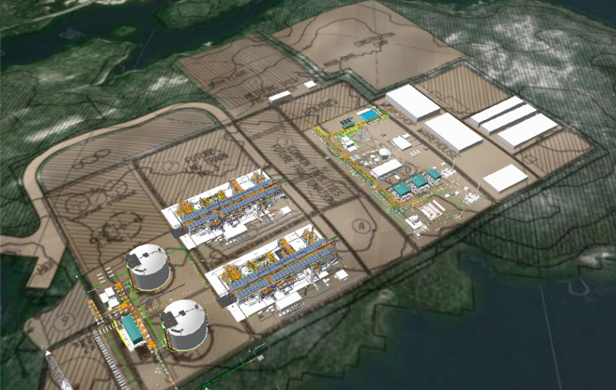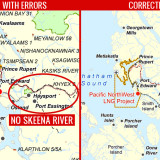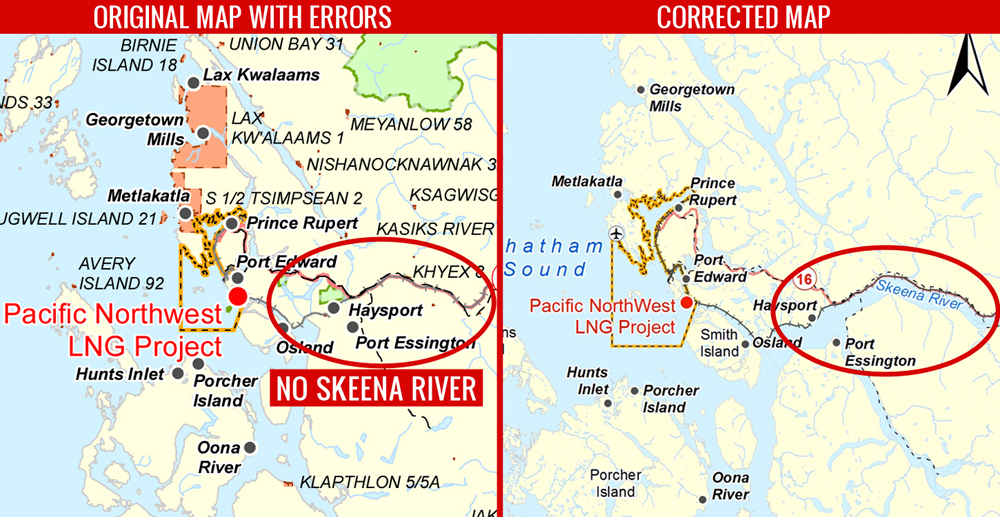
You would think Malaysian energy giant Petronas would have learned a lesson from fellow fossil fuel pipeline and coastal export terminal proponent Enbridge’s “disappearing islands” debacle last year. Enbridge was caught downplaying the risks of its Northern Gateway proposal by making 1,000 square km of islands vanish from the Douglas Channel in a digital animation of its tanker route from Kitimat.
Curiously, Petronas is following in Enbridge’s infamous footsteps with a blatantly inaccurate project description document for its proposed Pacific Northwest LNG (Liquefied Natural Gas) terminal near Prince Rupert. The document, submitted earlier this year to the Canadian Environmental Assessment Agency (CEAA) by Petronas’ newly-bought Canadian subsidiary, Progress Energy, made Canada’s second largest salmon river, the Skeena, disappear.
The inaccurate map was later corrected via a statement on CEAA’s website,but remains within the original project description document. The two maps are shown here, side-by-side.
West Coast Environmental Law, acting on behalf of its client, T. Buck Suzuki Foundation – an intervener in the LNG project’s environmental review – is calling for an extension to the now-closed window for public comment on Petronas’ project description and applications for funding for concerned groups and individuals to engage with future environmental hearings. In an August 14 letter to the federal agency overseeing the review, staff lawyer Andrew Gage wrote:
[quote]Notice is a key requirement of procedural fairness, and an inaccurate map that fails to indicate the proximity of the project to such a key environmentally significant feature fundamentally undermines that requirement…In our view, the Agency has an obligation to invite further public input related to the draft EIS and further opportunity to apply for participant funding.[/quote]
The mighty Skeena River, which flows from the Sacred Headwaters, near the community of Iskut in northwest BC, to the Pacific Ocean near Prince Rupert, is in dire straits these days. Its once-plentiful salmon stocks are in their worst condition in several decades this season, raising concerns about the impact of Petronas’ enormous proposed LNG terminal and associated tanker traffic through vital estuary habitat.
Central to that habitat is the second largest intact eel grass bed in BC, located at Flora Bank, right next to Petronas’ proposed project on Lelu Island. Out-migrating salmon smolts depend on this eel grass sanctuary to adjust to saltwater habitat as they head out to sea.
For this very reason, a proposed coal terminal on a neighbouring island was rejected by federal fisheries officers 40 years ago. A May, 1973 report summarized the likely impacts on key habitat from the smaller project: “Inverness Passage, Flora Bank and De Horsey Bank, in that order, are habitats of critical importance for the rearing of juvenile salmon. The construction of a superport at the Kitson Island-Flora Bank site would destroy much of this critical salmon habitat.”
The potential impact of Petronas’ project on Skeena salmon habitat is compounded by several other massive LNG terminal proposals nearby – including BG Group’s plant on Ridley Island and plans from major Asian and Australian natural gas players.
West Coast Environmental Law’s contention is that groups and individuals who would have otherwise been concerned about impacts of Petronas’ plant on the Skeena River may not have made submissions to the initial call for comments and intervener funding, based on misleading information about the project. “As a result of these inaccurate notices, it may well be that individuals who might be concerned about the Skeena River may have failed to appreciate the Project’s proximity to the river and failed to make comments, or to apply for participant funding, as a result.”
It remains to be seen whether CEAA acknowledges these complaints and determines further opportunity for public engagement is required as a result.



Wait until 2015 when the Canadian voters make the Harper government disappear, and they are nowhere on the political map.